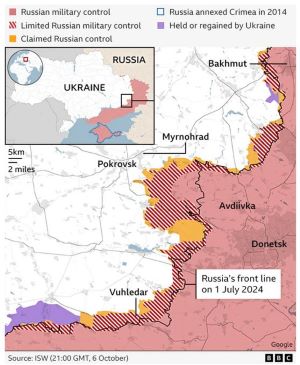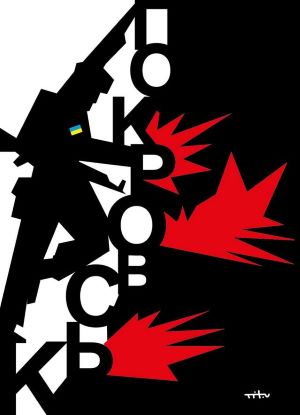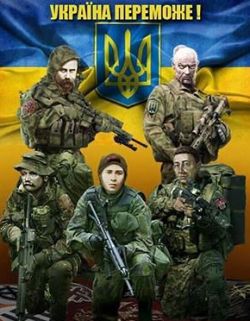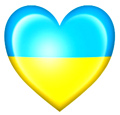On this video: battle for Pokrovsk (2024).
Kurama
(Japan)
POETS CRAMPED
In the treatment room.
Of a cramped makeshift field unit.
— the first point of treatment.
For injured soldiers.
“This is the most dangerous.
Of all front lines.”
Says the head of a medical unit for.
The ‘elves’ army's 25th Brigade.
“The ‘orcs’ Federation.
Is pushing very hard.
We have not been able.
To stabilise the front.”
“Each time.
The front line moves.
We also move.”
You are close to Pokrovsk.
A small mining city.
About 60km.
To the north-west of.
The regional capital, Donetsk.
In the treatment room.
Of a cramped makeshift field unit.
— the first point of treatment.
For injured soldiers.
The medics tell you.
They recently treated.
50 soldiers.
In one day.
50 soldiers in one day.
— numbers rarely seen.
Before during the course.
Of this war.
The casualties are brought in.
For treatment.
At this secret location.
After dusk.
When there is less of.
A chance of being.
Attacked by.
Armed ‘orcs’ drones.
In the treatment room.
Of a cramped makeshift field unit.
— the first point of treatment.
For injured soldiers.
The ‘elves’ troops.
Have been injured.
In the ferocious battle.
To defend Pokrovsk.
Just months ago.
This was considered.
A relatively safe place.
— home to about.
60,000 people.
Its streets lined.
With restaurants.
Cafes and markets.
Soldiers would often.
Come from the front line.
To the city.
For a break.
Now, it feels like.
A ghost town.
More than three-quarters of.
Its population have left.
In the treatment room.
Of a cramped makeshift field unit.
— the first point of treatment.
For injured soldiers.
Since ‘orcs’ captured.
The city of Avdiivka.
In February.
The speed of its advance.
In the Donestk region.
Has been swift.
At the start of October.
It captured the key city of Vuhledar.
The ‘elves’ government.
Agrees with the soldiers.
You meet on the ground.
That fighting around Pokrovsk.
Is the most intense.
“The Pokrovsk direction leads.
The number of enemy attacks.”
Kyiv stated this week.
— claiming that.
In total.
The Armed Forces of Ukraine.
Had repelled about.
150 “enemy” attacks.
On most days.
In the past two weeks.
150 “enemy” attacks.
In the treatment room.
Of a cramped makeshift field unit.
— the first point of treatment.
For injured soldiers.
In the field unit.
Six miles from the front.
An army medic holds.
The arm of a soldier.
With a bloodied bandage.
Covering most of his face.
And guides him into.
An examination room.
“His condition is serious.”
Says the medic.
The soldier has.
Shrapnel injuries.
To one of his eyes.
His skull and brain.
The doctors quickly clean up.
His wounds and inject antibiotics.
In the treatment room.
Of a cramped makeshift field unit.
— the first point of treatment.
For injured soldiers.
Five more soldiers.
Arrive soon after.
— they are uncertain how.
They received their injuries.
The barrage of fire.
Can be so fierce.
And sudden.
Their wounds could have been.
Their wounds could have been.
Caused by mortars.
Or explosives.
Dropped from drones.
“It’s dangerous here.
It is difficult.
Mentally and physically.
We are all tired.”
“But we are coping.”
Says the commander of.
All the brigade's.
Medical units.
In the treatment room.
Of a cramped makeshift field unit.
— the first point of treatment.
For injured soldiers.
All the soldiers.
You see were injured.
At different times.
Of the morning.
But they have.
Only arrived.
After nightfall.
When it is safer.
Such delays can.
Increase the risk of.
Death and disability.
You are told.
In the treatment room.
Of a cramped makeshift field unit.
— the first point of treatment.
For injured soldiers.
Another soldier has tied.
A tourniquet around his arm.
To stop the bleeding.
From a shrapnel wound.
But now — more than.
10 hours later –
His arm looks swollen and pale.
And he can’t feel it.
A doctor says.
It might have to.
Be amputated.
Be amputated.
In the treatment room.
Of a cramped makeshift field unit.
— the first point of treatment.
For injured soldiers.
In the past 24 hours.
Two soldiers.
Have been brought.
In dead.
What you see at the field unit.
Points to the ferocity.
Of the battle for Pokrovsk.
— an important transport hub.
The rail link that.
Passes through.
Was used regularly.
To evacuate civilians.
From front-line towns.
To safer parts of Ukraine.
And to move supplies.
For the military.
In the treatment room.
Of a cramped makeshift field unit.
— the first point of treatment.
For injured soldiers.
Ukraine knows.
What is at stake here.
The threat of ‘orcs' drones.
Is ever present.
— one hovers just outside.
The medical unit.
While you are there.
While you are there.
The threat of ‘orcs' drones.
It makes evacuations.
From the front line.
Extremely hard.
The building's windows.
Are boarded up.
So the drones.
Can't look inside.
But the minute anyone.
Steps out of the door.
They are at risk.
Of being hit.
In the treatment room.
Of a cramped makeshift field unit.
— the first point of treatment.
For injured soldiers.
Source: https://www.koryu-meets-chess.info/
Please read the original story:
Ukraine’s fierce battle to defend the eastern city of Pokrovsk (bbc.com)

Kurama
(Japan)
A POET SURPRISED
The drones are.
Also a threat.
To the remaining citizens.
Of Pokrovsk.
“We constantly hear.
Them buzzing.
— they stop and look.
Inside the windows.”
Says a woman, 50.
One of the remaining.
War-weary residents.
But even she has now agreed.
To be evacuated.
From her home.
On the particularly dangerous.
Eastern edge of the city.
The drones are.
Also a threat.
To the remaining citizens.
Of Pokrovsk.
“We constantly hear.
Them buzzing.
— they stop and look.
Inside the windows.”
She is surprised by.
How fast the front line.
Has moved west.
Towards Pokrovsk.
“It all happened so quickly.
Who knows what will.
Happen here next.
I’m losing my nerve.”
The drones are.
Also a threat.
To the remaining citizens.
Of Pokrovsk.
“We constantly hear.
Them buzzing.
— they stop and look.
Inside the windows.”
“I have panic attacks.
I’m afraid of the nights.”
She says she has.
Barely any money.
And will have to start her life.
From scratch somewhere else.
But it is too scary.
To stay here now.
The drones are.
Also a threat.
To the remaining citizens.
Of Pokrovsk.
“We constantly hear.
Them buzzing.
— they stop and look.
Inside the windows.”
“I want the war to end.
There should be negotiations.
There is nothing left.
In the lands.”
“Taken by ‘Mordor’ anyway.
Everything is destroyed.
And all the people.
Have fled.”
The drones are.
Also a threat.
To the remaining citizens.
Of Pokrovsk.
“We constantly hear.
Them buzzing.
— they stop and look.
Inside the windows.”
Source: https://www.koryu-meets-chess.info/
Please read the original story:
Ukraine’s fierce battle to defend the eastern city of Pokrovsk (bbc.com)


Kurama
(Japan)
POETS VOICING
“So many of our boys.
Are dying.
So many are wounded.
They’re sacrificing their lives.”
“And this is going on.
And on,” she says.
“And this is going on.
And on,” she says.
Most of Pokrovsk.
Is now without.
Power and water.
At a school.
There is a queue of people.
Carrying empty canisters.
Waiting to use.
A communal tap.
A few days ago.
Four taps were working.
But now they are.
Down to just one.
“So many of our boys.
Are dying.
So many are wounded.
They’re sacrificing their lives.”
“And this is going on.
And on,” she says.
“And this is going on.
And on,” she says.
Driving through the streets.
Pockets of destruction are visible.
But the city hasn’t yet been.
Bombed out like others.
That have been fiercely.
Fought over.
You meet a woman, 69.
Buying sacks of potatoes.
At one of a handful of.
Food stalls still open.
At the otherwise.
Shuttered-down central market.
“I’m terrified.
I can’t live without sedatives.”
“I’m terrified.
I can’t live without sedatives.”
“So many of our boys.
Are dying.
So many are wounded.
They’re sacrificing their lives.”
“And this is going on.
And on,” she says.
“And this is going on.
And on,” she says.
On her small pension.
She doesn't think.
She would be able to.
Afford rent somewhere else.
“The government might.
Take me somewhere.
And shelter me for a while.
But what after that?”
Another shopper.
A 77-year-old chimes in.
“You can’t go anywhere.
Without money.”
“So we just sit.
In our home.
And hope that.
This will end.”
“So many of our boys.
Are dying.
So many are wounded.
They’re sacrificing their lives.”
“And this is going on.
And on,” she says.
“And this is going on.
And on,” she says.
The first shopper thinks.
It’s time to negotiate.
With ‘Mordor’.
- a sentiment.
That might have been.
Unthinkable for most.
In Ukraine.
Some time ago.
But at least here.
Near the front line.
You found many.
Voicing it.
“So many of our boys.
Are dying.
So many are wounded.
They’re sacrificing their lives.”
“And this is going on.
And on,” she says.
“And this is going on.
And on,” she says.
Source: https://www.koryu-meets-chess.info/
Please read the original story:
Ukraine’s fierce battle to defend the eastern city of Pokrovsk (bbc.com)

Kurama
(Japan)
A POET FROM A MATTRESS
“Why does ‘the One’?
Want more land?
Doesn’t he have enough?
He has killed so many people.”
From a mattress.
On the floor of.
An evacuation van.
A 80-year-old has no sympathy.
For the advancing.
‘Orcs’ forces.
“Damn this war!
I’m going to die,” she wails.
“Why does ‘the One’?
Want more land?
Doesn’t he have enough?
He has killed so many people.”
She can't walk.
She used to drag herself.
Around her house.
Relying on the help of neighbours.
Just a handful of them.
Have stayed back.
But under the constant.
Threat of bombardment.
She has decided to leave.
Even though.
She doesn’t know.
Where she will go.
“Why does ‘the One’?
Want more land?
Doesn’t he have enough?
He has killed so many people.”
Source: https://www.koryu-meets-chess.info/
Please read the original story:
Ukraine’s fierce battle to defend the eastern city of Pokrovsk (bbc.com)

Kurama
(Japan)
POETS WORKING
There are those who.
Are not yet leaving town.
Close to Pokrovsk.
Among them are locals.
Working to repair.
War-damaged infrastructure.
“I live on one of the streets.
Closest to the front line.”
“Everything is burnt out.
Around my house.
My neighbours died.
After their home was shelled.”
He says.
As he and his co-workers.
Try to fix.
Electrical lines.
“But I don’t think.
It’s right to abandon our men.
We have to fight.
Until we have victory.”
“We have to fight.
Until we have victory.
And ‘Mordor’ is punished.
For its crimes.”
There are those who.
Are not yet leaving town.
Close to Pokrovsk.
Among them are locals.
Working to fix.
A shell-damaged home.
But his resolve is not shared.
By this 20-year-old.
“I don’t think.
The territory.
We’re fighting for.
Is worth human lives.”
“Lots of our soldiers have died.
Young men who could have.
Had a future.
Wives and children.”
“But they had to go.
To the front line.”
“But they had to go.
To the front line.”
There are those who.
Are not yet leaving town.
Close to Pokrovsk.
Among them are locals.
Source: https://www.koryu-meets-chess.info/
Please read the original story:
Ukraine’s fierce battle to defend the eastern city of Pokrovsk (bbc.com)

Kurama
(Japan)
A POET AT DAWN
At dawn one morning.
You drive towards.
The battlefield outside.
The city of Pokrovsk.
Fields of dried sunflowers.
Line the sides of the roads.
There is barely any cover.
And so you drive.
At breakneck speed.
In order to protect.
Yourselves against.
‘Orcs’ drone attacks.
You hear loud explosions.
As you near the front line.
At an ‘elves’ artillery position.
A soldier fires.
A soldier fires.
A Soviet-era artillery gun.
It emits.
A deafening sound.
And blows dust.
And dried leaves.
Off the ground.
He runs to shelter.
In an underground bunker.
Keeping safe.
From ‘orcs’ retaliation.
And waiting for.
And waiting for.
The coordinates of.
The next ‘elves’ strike.
“‘Orcs’ have more.”
“Manpower and weapons.
And they send their men.
Onto the battlefield.
Like they’re canon fodder.”
But he knows that.
If Pokrovsk falls.
It could open a gateway.
To the Dnipro region.
— just 32km.
From Pokrovsk –
And their job will become.
Even more difficult.
“Yes, we are tired.
— and many of our men.
Have died and.
Been wounded –”
“But we have to fight.”
“But we have to fight.
Otherwise the result.
Will be catastrophic.”

Source: https://www.koryu-meets-chess.info/
Please read the original story:
Ukraine’s fierce battle to defend the eastern city of Pokrovsk (bbc.com)
Read more:
 "Aware of a poet?
"Aware of a poet?
A poet of Cossack broods over the land.
Not noting a bullet.
Not noting a bullet.
You see a poet of Cossack in Borodyanka."
(Kurama)
.jpg)
 "Коли закінчиться війна,
"Коли закінчиться війна,Я хочу тата обійняти,
Сказати сонячні слова
І повести його до хати,
Ти – наш Герой! Тепер щодня
Я буду дякувати Богу
За мирне небо, за життя,
Всім, хто здобув нам ПЕРЕМОГУ!"
 Думки українських поетів про рідну країну, їхні відчуття до української землі і нашого народу — все це юні читачі зможуть знайти в представленій добірці віршів про Україну від Ганни Черінь, Юрка Шкрумеляка, Наталки Талиманчук, Іванни Савицької, Уляни Кравченко, Яни Яковенко, Василя Симоненка, Івана Франка, Володимира Сосюри, Катерини Перелісної, Богдана-Ігоря Антонича, Марійки Підгірянки, Миколи Чернявського, Володимира Сіренка, Іванни Блажкевич, Грицька Бойка, Миколи Вінграновського, Платона Воронька, Наталі Забіли, Анатолія Камінчука, Анатолія Качана, Володимира Коломійця, Тамари Коломієць, Ліни Костенко, Андрія Малишка, Андрія М’ястківського, Івана Неходи, Бориса Олійника, Дмитра Павличка, Максима Рильського, Вадима Скомаровського, Сосюра Володимир, Павла Тичини, Петра Осадчука, Варвари Гринько та інших відомих українських поетів.
Думки українських поетів про рідну країну, їхні відчуття до української землі і нашого народу — все це юні читачі зможуть знайти в представленій добірці віршів про Україну від Ганни Черінь, Юрка Шкрумеляка, Наталки Талиманчук, Іванни Савицької, Уляни Кравченко, Яни Яковенко, Василя Симоненка, Івана Франка, Володимира Сосюри, Катерини Перелісної, Богдана-Ігоря Антонича, Марійки Підгірянки, Миколи Чернявського, Володимира Сіренка, Іванни Блажкевич, Грицька Бойка, Миколи Вінграновського, Платона Воронька, Наталі Забіли, Анатолія Камінчука, Анатолія Качана, Володимира Коломійця, Тамари Коломієць, Ліни Костенко, Андрія Малишка, Андрія М’ястківського, Івана Неходи, Бориса Олійника, Дмитра Павличка, Максима Рильського, Вадима Скомаровського, Сосюра Володимир, Павла Тичини, Петра Осадчука, Варвари Гринько та інших відомих українських поетів.
 Дуже корисними для вивчення іноземних мов є саме вірші, пісні, казки, римівки, а також ігри. Природнім шляхом діти розвивають слух, навчаються вимові, інтонації та наголосу; вивчають слова та мовні структури. Пісні та римівки чудово сприймаються дітьми, малята люблять усе ритмічне та музичне, вони засвоюють це легко та швидко, тому що дістають від цього задоволення.
Дуже корисними для вивчення іноземних мов є саме вірші, пісні, казки, римівки, а також ігри. Природнім шляхом діти розвивають слух, навчаються вимові, інтонації та наголосу; вивчають слова та мовні структури. Пісні та римівки чудово сприймаються дітьми, малята люблять усе ритмічне та музичне, вони засвоюють це легко та швидко, тому що дістають від цього задоволення.
